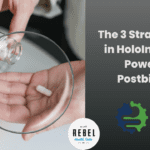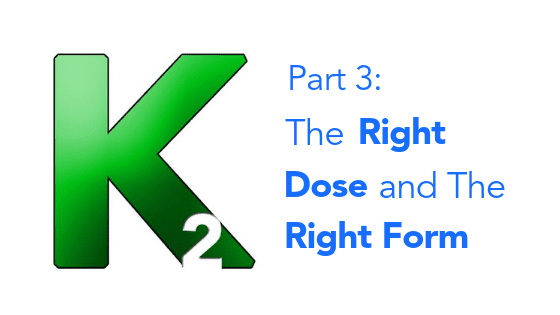
Play Video
K2, Part 3: The Right Dose and The Right Form
In this video, I interview Kiran Krishnan, an expert on Vitamin K2. Kiran is a microbiologist and has done extensive research on the benefits of Vitamin K2. In this interview, we discuss the right dose and form of Vitamin K2 to take for optimal health.
If you’d like to learn more about Vitamin K2 and why it’s so important, Read This Article.
Want to learn more about the only complete dose K2 Supplement with essential co-factors?
Webinar Transcript
Kiran: Yeah and in fact, cardiac output is one of the ways they test now. Cardiologists will test how healthy your heart is for surgery and things like that because your cardiac output determines how much blood your heart receives as well. So that’s a very important measure as to how healthy your cardiovascular system is. And in fact with the lower cardiac output increases your risk of cardiovascular events much dramatically and that’s actually one of the big benefits of exercise, it’s improving your cardio output, your cardiovascular system. So K2 kind of gives that to you in itself. It’s optimizing your cardiac muscle’s ability to function to contract, improving the vascular system so it’s more compliant… We also did another study on muscle cramping. Vitamin K2 seems to be essential for muscle contraction. Because muscle contraction is dependent on ion fluxing calcium potassium ion flux. And anywhere calcium functions K2 plays a role. So what we found is that adequate amounts of vitamin K2 actually dramatically reduces muscle cramps. And so a lot of people get idiopathic cramping, mostly because of their micronutrient deficiencies, but in many cases, it’s induced by prescription medications and things like that. So we used those kinds of patients and saw huge decreases in chronic muscle cramps and restless leg and those kind of nerve issues. So it works on so many things, it’s such an essential nutrient that we don’t get any of it at all from our diet. It’s amazing. We did an estimate based on all the large-scale studies just on heart disease, diabetes, and a couple types of cancers… We estimated that if starting today, every adult (and just adult not talking about kids), every adult in the US start taking a minimum amount of vitamin K2 every day, in a year we would save almost half a million lives. Almost half a million lives from cardiovascular disease, osteoporosis, hip fractures, things like that, diabetes, and so on… And so it’s such an important nutrient that really cannot be ignored and it’s finally starting to come to the point of being a recognition. Dr. Oz had mentioned that a couple of times on his show over the last couple years, but there’s always issues with it. A good supply is the whole other question.
Michael: Yeah and let’s talk about that a little bit. Half a million lives is a lot. That’s a bold statement. So I had been taking a product based on your recommendation before you guys created what you’ve created, but it’s Medaquin Gold I believe it was called. K2-7. And so your company you guys have created Megaquinone. And that’s a vitamin K2 product that you’ve just recently released. For our audience– the unbelievable results and success that our people have seen with Megaspore. You guys got a lot of street credit in the Rebel Health Tribe arena to start off with but… Why did you feel the need to create the product when you had told me like this product is pretty good, why did you create it, Megaquinone, and what’s a quinone, and why was there a need, why is it different or better than any other K2 products that you have seen?
Kiran: (On the market.) So I’ve been working on the raw ingredient side of vitamin K2 for the last 10-12 years. And the manufacturing of vitamin K2 both on the pharmaceutical side because the K2 that we make and we study and research is actually used by many big farmer companies as prescription products in different parts of the world. Mostly in Asia. And on the research side as well. So we’ve been studying K2 and writing patents, we’ve got 3 global patents on new discoveries of vitamin K2. That’s been my role in vitamin K2 and actually, I’ve been supplying vitamin K2 to some product companies out there that have put it in certain products. Now the problem that I found in the marketplace is there are several different supplies of vitamin K2 as raw material. But one of the issues with vitamin K2 is it’s a very active material, it’s a very active compound, which means that it’s also very sensitive. And so it’s very sensitive to moisture, it’s actually photoreactive so it’s sensitive to light exposure, it’s sensitive to being mixed with other things like calcium or magnesium and other ions. And so what happens is when you’re manufacturing and formulating with vitamin K2 you degrade the activity of K2 pretty fast. And so what we started to see in the marketplace was a lot of products that contained vitamin K2 and it actually had huge decreases in what they actually claimed on the label because of the manufacturing process and the instability of the actual vitamin K2. So we actually were getting a lot of requests from our doctors at work with us at Megaspore to come up with a pharmaceutical grade vitamin K2 that actually has the adequate activity level and also has key supportive ingredients in it that most products lack. So step 1 is we want it to utilize the only all-natural pharmaceutical grade vitamin K2 so it has the stability to survive through the processing of being blended and capsulated, bottled and all that. So the potency of it is 100% guaranteed. The other part of it is we want it to get the right dose. So right now the marketplace if you go around looking for a vitamin K2 product you’ll find some of the highest ones are 150 micrograms a day. 150 micrograms a day is good, it’s a good dose, and it’s better than not taking K2. But the latest study showed that the optimum dose of vitamin K2 to carboxylate all the different proteins that it works on is around 320 micrograms. And in fact our studies on the cardiovascular stuff that we talked about on the cardiac output, on the neuropathy stuff, on the cramping and all these other areas that we’ve studied that mitochondrial stuff all show that the high dose of vitamin K2 is necessary to see those functions. And so we are of the strong mindset that the optimum dose of vitamin K2 is 320 micrograms a day. That’s what you really need. Even if you’re taking 45 micrograms, it’s better than taking nothing, but why would you not take the most optimum therapeutic dose of vitamin K2. Stability of the product was actually important. You wanna be guaranteed that when you take that capsule there are 320 micrograms in there. Consumer labs and other places have done some studies on K2 products on the market and have shown huge degradations in the product. Number 2 is it’s the only 320 microgram dose product there is on the market, so it’s the only optimum dose K2 product on the market. Number 3 is its very important supportive ingredient. The first one is K1. And you have to have some amount of K1 in a K2 product. And the reason for that is because a lot of people tend to be deficient in K1 as well. Because they’re not eating enough leafy greens.
Michael: That’s the one that stays in the liver right?
Kiran: The one that stays in the liver, exactly. Now, what happens if you take K2 and you’re deficient in K1, the liver will hold onto K2, and try to utilize it in place of K1 and not release it into the peripheral tissues. And so if you are somebody that’s deficient in K1 and you’re taking 300 micrograms of K2, you’re not getting 300 micrograms of K2 going into the rest of the tissue. So in order to optimize the bioavailability of the K2 to the rest of the tissue that the brain, the nerve cells, the cardiovascular system, the bones, you have to make sure that you’re getting at least the RDA levels of K1 so your liver releases the K2. So we have K1 in there. That’s a very important step. Number 2 is you have to have 3 very important micronutrients that act as cofactors for many of the reactions that vitamin K2 performs. One of them is magnesium, the other one is zinc, and the third one is boron. And boron is something that many people are deficient in as well. They just don’t take enough of a really good bioavailable boron. We always like the gluconates and the protein bound versions of these micronutrients. So we wanted to put adequate amounts of those micronutrients in there because again, in the body everything depends on one another. So if you’re taking a bunch of K2 but you’re boron deficient, you’re not getting all the functions out of K2. So what we’ve created is this super K2 absorption complex we call it, with the most necessary ingredients for the K2 to be very bioavailable, getting into peripheral tissue, and then be able to function in the peripheral tissue. And it’s the only product on the market that has that and we’ve been working with K2 for 10 years, we’ve talked to other companies about doing this. But putting this kind of formulation together, people always talk about cost and this and that and all whatever issues so finally we said that we’re gonna make our own highly functionally highly potent K2 product. It’s too important of a nutrient for people to not get adequate amounts of it every day.
Michael: That all makes total sense. And something I’ve been seeing all over the natural health world lately is people ingesting borax. And you said boron and that made me think of it and borax is a cleaning product from like the 50’s and 60’s. Actually, I was just in Death Valley this last weekend, which was the place where the borax was all mined. And there are all these abandoned borax mines. And I thought borax was the name brand for a boron, but I guess borax is its own form of I don’t know everything there said borax mines. So I don’t know but… How does the boron in your product differ from borax?
Kiran: So the boron is from fruit, actually it’s a fruit called borax. So it is conjugated with proteins and things like that that keep it stable going through the digestive tract, and then it’s cleaved and then the boron being made bioavailable. So it’s a very natural form of boron. It’s a form that you would naturally get as a hunter and gatherer if you’re foraging a lot of fruits and berries and things like that. And it’s also very well clinically studied – this particular source of it.
Michael: Okay. So I haven’t researched the borax phenomenon to know whether or not I should warn people against it or in its inert or whatever. But I’d just figure I’d throw that in there. I’ve heard that. So as far as someone considering after listening to this I kind of just wanna fill up a bowl with K2 pills and eat them with a spoon, but like you mentioned earlier, there’s too much of any vitamin. Like when you’re talking about vitamin D. So you guys believe that the 320 micrograms is about the optimal dose. So more is not necessarily better. So taking 15,000 micrograms of K2 a day, wouldn’t necessarily have any benefit beyond the 300 and it could potentially throw things out of balance in the other direction, correct?
Kiran: Exactly yeah. And 320 micrograms from the most recent clinical trials have shown that gives you the most almost 97% carboxylations, so that means almost 97% of the proteins that are dependent on K2 are now active in it which is what you want, and then you’re not getting any excessive buildup in the body as well. K2 is recycled to some degree but it has a 72 hour half life in the body so once the body is done with it or if there’s excessive amounts it will get rid of it, but the 320 micrograms is the optimum. Now from a safety standpoint, we have tested K2 at 10 times that level and it doesn’t cause any issue. But from a clinical standpoint, 320 micrograms will do you all the benefits that you need from K2.
Michael: So as far as people who would see the most benefits or would probably be the most or for practitioners reading this his like who you’d wanna recommend it to or potentially use it with. You’re looking at anybody with any sort of cardiovascular disease, maybe some arthritis and chronic pains, calcification plays a role there, brain conditions, and neurological related things, memory, brain issues, dementia, Alzheimer’s, athletes who are looking at improved cardiac output, blood sugar issues… So, unfortunately, that makes up most of our population today I think.
Kiran: Yeah and at the end of the day it’s an essential nutrient right, so we need it in a diet. So I always tell people everybody should be taking K2. Unless for some reason you eat a lot of natto which then you’re fine you don’t need to take K2, or you eat a lot of organ meat or certain types of fermented cheeses out in Northern Europe, you’re totally fine you don’t need it. But in the US nobody does that and so everybody here needs to take K2 because it’s an essential nutrient and at the end of the day if don’t get enough K2 no matter who you are no matter how healthy you are, the chronic deficiencies of vitamin K2 will manifest itself in some way or the other. It will manifest itself in the form of diabetes, osteoporosis, cardiovascular disease, senile dementia, whatever it may be, we now know that vitamin K2 plays a critical role in supporting a healthy system in all of these conditions. Now the other people that are really really in need of K2 are kids. So adults have bone turnover, I think a lot of people have heard that term bone turnover. Your bone turns over in a cycle a few times a year where basically you have calcium being removed from your bones and then new calcium being put on your bones… Kids have 8 times the amount of bone turnover that adults do. And that’s because they have growing bones. And that’s when you start to build the strength and the rigidity of your bones, so kids who have even worse diets than adults do typically, need K2 even more than adults. And in fact there have been a number of very large studies on children, 600-700 children that showed that kids who get adequate amounts of vitamin K2 build much stronger bone, have much lower incidents of fractures and things like that. And actually one of the things that most people don’t know is that you reach your peak bone mass around 25-30 years old. Once you’ve reached your peak bone mass you really can’t put more mass or strength into your bones. At that point, osteoporosis starts. So from that point on you start to lose bone. How fast you lose bone will determine whether or not you have osteoporosis and disease. So the key is to build as much bone and as much strong bone as you can, so you reach your peak bone mass. So for kids it’s extremely important as well. And of course and because it plays a role in brain development, it plays a role in nerve development, all of that is very important for kids.
Michael: Okay, so that’s just about everyone. Any contraindications I had mentioned in K1 and blood thinning medications like Coumadin earlier, would people on medications definitely want to talk to their doctor about it, or are there any contraindications at all, general ones?
Kiran: Not for K2, but since the product does contain K1 in it, which is 90 micrograms of K1, which is a relatively small amount of K1… It’s just enough to give your liver the satisfaction it needs to not hold on to K2. But still talk to your doctor. If you’re on Coumadin, Warfarin, if you’re on any sort of anticoagulant therapy, talk to your doctor about that amount. Usually, that amount is fine because it’ll balance out your PT and INR will balance out and there can be adjustments made to the Coumadin levels and things like that. But certainly, if you are on anticoagulant therapy talk to your doctor about it.
Michael: Cool. I think that covers everything I wanted to know plus a whole bunch of stuff that I didn’t even know was there to ask. So we’ll probably do a webinar with you on this topic sometime in the next month or two to let our audience have a crack at asking questions. I just wanted to get a bunch of the information out there. Your new product’s called Magquinone. We’re gonna be carrying it for our members to go along with the Megaspore and we get asked to pitch… People probably wouldn’t believe it if I told them the actual number of products or services or events or summits or t-shirts or who knows what that we’re regularly asked to promote and pitch and sell and recommend and endorse, and really I would say this obviously this is only the second product ever brought into our site to directly sell, and it’s something that I believe really strongly in and that Joe believes really strongly in and the research is super solid on it and we’ve been blown away with what we’ve seen with over 1,000 people now with Megaspore. We’ve connected over 1,000 people with that, and I still just got another phone call today from someone saying they were able to enjoy their trip in New Orleans because they didn’t get sick from eating all the food they used to make. And just little things like that like sure that’s not a serious medical condition or whatever but anybody who’s been to New Orleans to be able to eat that food, that’s rewarding and great results in itself so I mean we don’t endorse things lightly, we don’t put our brand on things lightly, and I’m really excited about this, to see what kind of feedback we get from it, and to see where it goes and to use it ourselves. So I really appreciate you taking the time, I see it’s dark there. I appreciate the time and for sharing all this information and for what you guys are doing. I mean you saw a need for a product and you work on the supply side you said to the company guys you should make this you should put this in there, nobody listened so you made did it yourself. And I know that it might be easier on the supply end or the raw materials and then being on the retail end and the promotions end the market end and dealing with all that stuff but you guys saw a need for it and nobody was making it so you just did it. And so we solute you on that too.
Kiran: Yeah well thank you and there’s a huge need for it and we think that people are gonna experience some tremendous things with it. One of the things with K2 even though it’s helping your heart and bones, things that you don’t necessarily feel, when you have the right amount of K2, the energy you feel, and the changes in your skin and hair and nails, all those things are all very tangible and realized and I think you’ll start getting some really great feedback from people. It’s been great and we’re very honored and happy to be able to work with you guys on this.
Michael: Awesome. Well, for now, we’ll let you go, thanks a lot Kiran we’ll have you back for another Microbiome Series here soon and probably a webinar on K2 next month. We’re actually thinking about doing a whole webinar series on fat-soluble vitamins, vitamin D, the sun, all the myths around sunlight and cholesterol… The thing that’s holding us back is we’re trying to figure out a coherent way of what to name that or whatever but there’s the sunlight, the sunscreen, the vitamin D, the cholesterol, the K2, vitamin A, magnesium… How do they all work together so there’s a lot of confusion around that and I think this interview will be our first step towards putting together more pieces of that puzzle… So thanks a lot, and we will talk to you very soon.
Kiran: Yeah, take care. Thank you Mike.

Kiran Krishnan, Microbiologist
About our Guest
Kiran Krishnan is a Research Microbiologist and has been involved in the dietary supplement and nutrition market for the past 17 years. He comes from a strict research background having spent several years with hands-on R&D in the fields of molecular medicine and microbiology at the University of Iowa. He left University research to take a position as the U.S. Business Development and Product Development lead for Amano Enzyme, USA. Amano is one of the world’s largest suppliers of therapeutic enzymes used in the dietary supplement and pharmaceutical industries in North America. Kiran also established a Clinical Research Organization where he designed and conducted dozens of human clinical trials in human nutrition.
Kiran is also a co-founder and partner in Nu Science Trading, LLC.; a nutritional technology development, research and marketing company in the U.S. Dietary Supplement and Medical Food markets. Most recently, Kiran is acting as the Chief Scientific Officer at Physician’s Exclusive, LLC. and Microbiome Labs. He has developed over 50 private label nutritional products for small to large brands in the global market. He is a frequent lecturer on the Human Microbiome at Medical and Nutrition Conferences. He conducts the popular monthly Microbiome Series Webinars through the Rebel Health Tribe Group practitioner training program, is an expert guest on National Radio and Satellite radio and has been a guest speaker on several Health Summits as a microbiome expert. He is currently involved in 9 novel human clinical trials on probiotics and the human microbiome.
Kiran is also on the Scientific Advisory Board for 5 other companies in the industry. Kiran offers his extensive knowledge and practical application of the latest science on the human microbiome as it relates to health and wellness.






